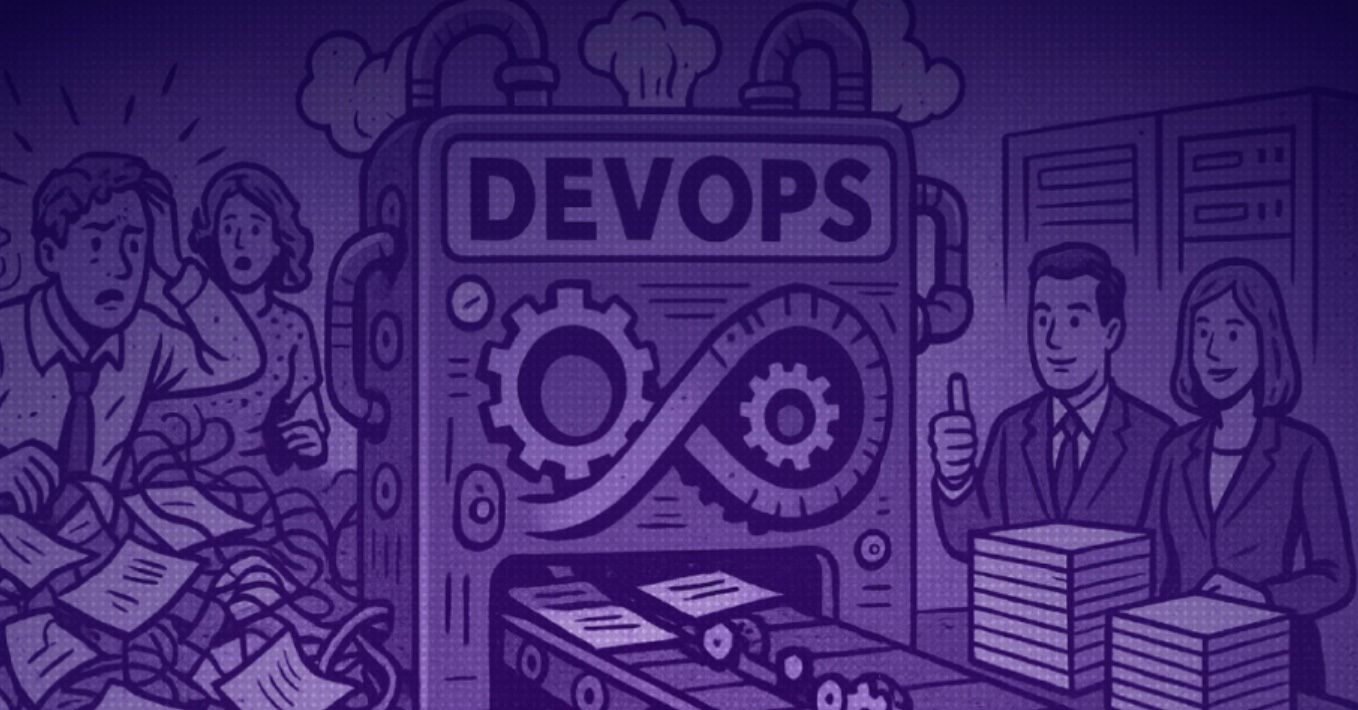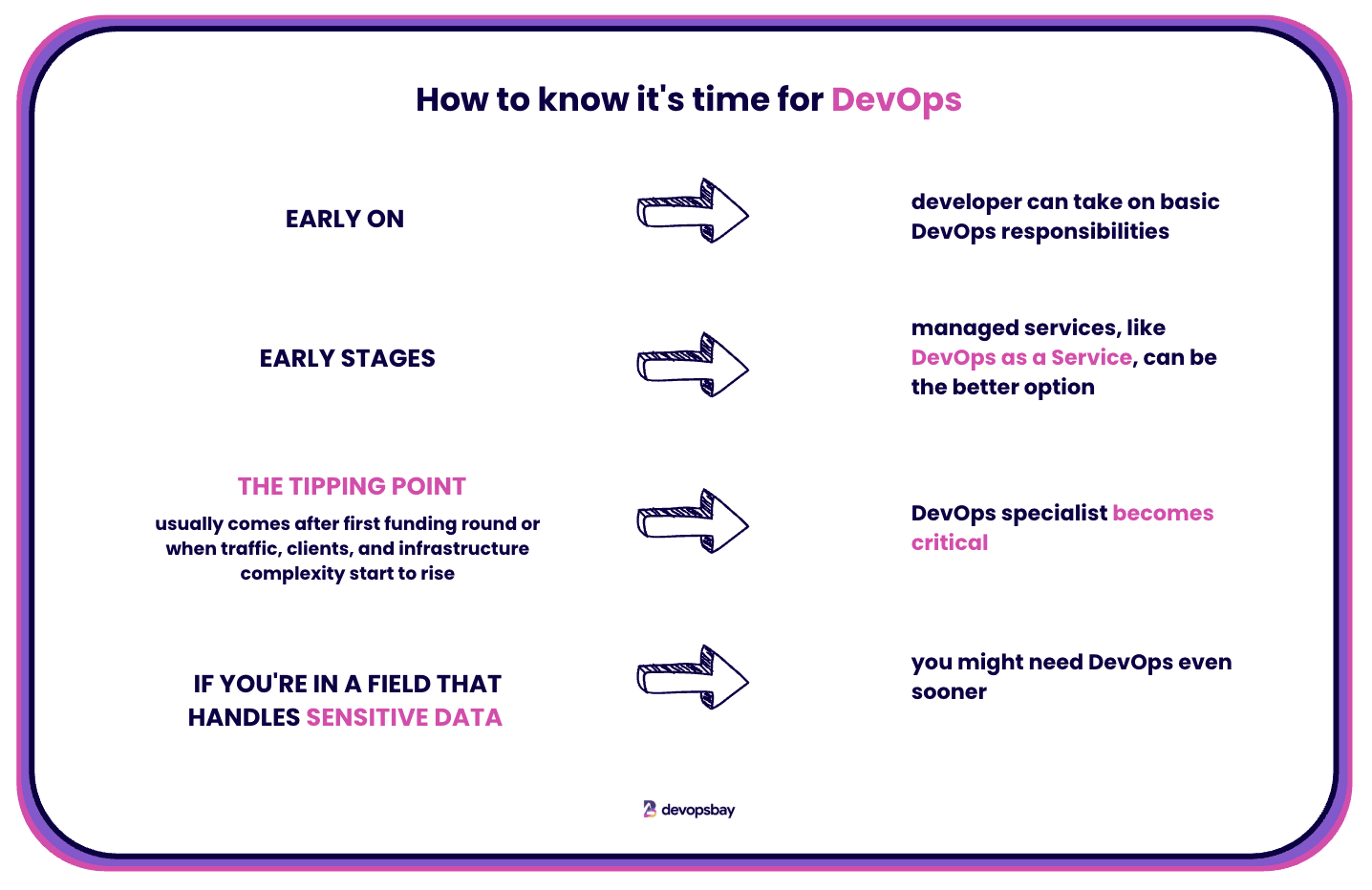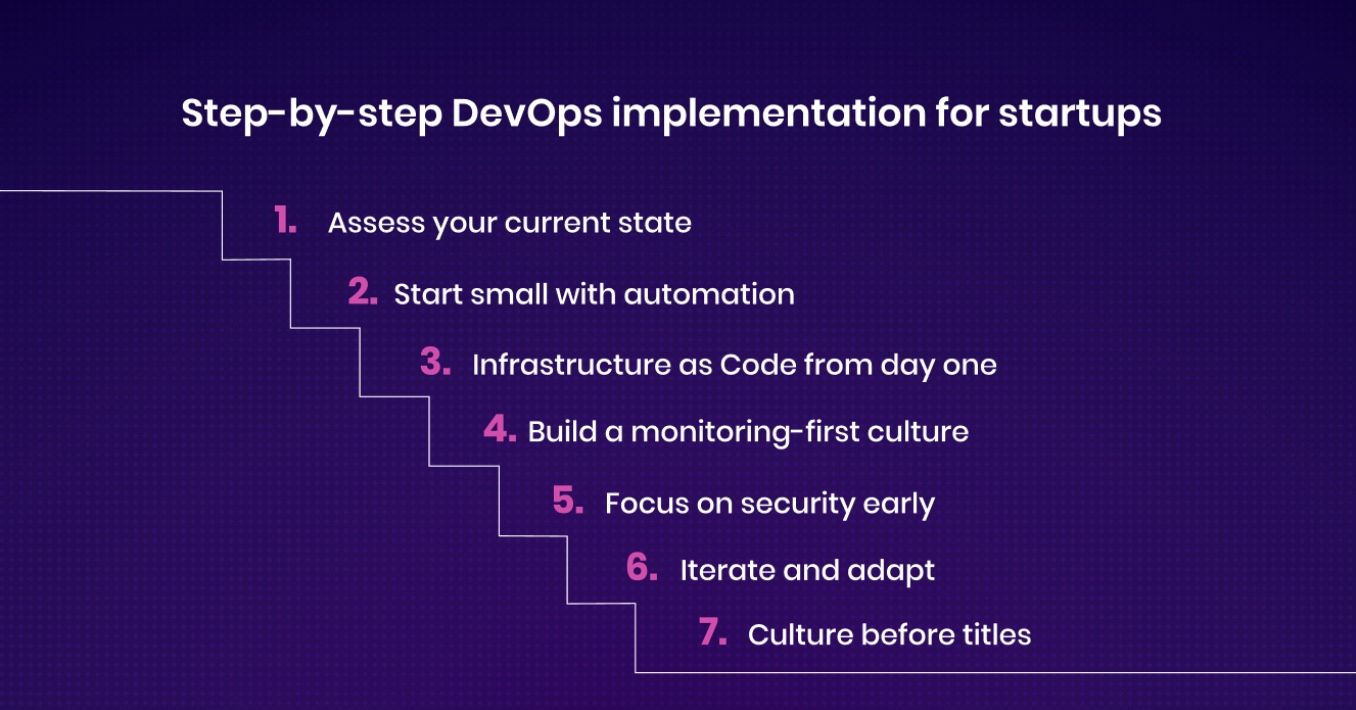- DEVOPS
- STARTUPS
DevOps for Startups
Sep 9, 2025
-
Emilia Skonieczna
-
11 minutes

Why exactly do startups need DevOps? The answer is simple: make it work, make it fast, and make it cheap. And honestly - who doesn't love that?
DevOps for startups isn't just CI/CD pipelines and Kubernetes clusters. Imagine upgrading a high-speed train while it's still running - making sure it goes faster, smoother, and further without ever missing a stop. It's more like that.
In a young company, DevOps isn't a luxury, it's usually a survival strategy. With constant change and evolving demands, having a system that helps you stay on top of things is necessary. DevOps keeps things in motion, making sure you're always ready to adapt, fix, and grow - no matter what comes next.
For startups, the stakes are high and the margin for error is small. That's why DevOps isn't just a nice-to-have - it's a key enabler for startups to scale quickly, control costs, and remain agile in a competitive environment.
So... what do you say about having DevOps in your startup?
In early-stage startups, usually one person is responsible for multiple things: from managing cloud services, fixing bugs, to meeting tight deadlines - sometimes all before lunch. At this point, there usually aren't formal teams or departments, and the responsibility often falls to whoever is most familiar with the system and has the technical skills to make things work.
That's where DevOps comes in. It helps bring order to the chaos. It's not about building perfect systems, but about making sure things run smoothly, even when everyone is juggling multiple tasks at once. But who knows, perfection might just happen along the way ;)
DevOps can automate repetitive tasks, ensure reliability, and helps teams respond quickly to changes, giving startups the flexibility to scale without the risk of things breaking down.
The goal isn’t perfection, but to ensure that every deploy doesn’t feel like a leap of faith.

In enterprises, DevOps is often a well-funded initiative with specialized teams, clear roles, and defined roadmaps. For startups, it's often a one-person show or a small DevOps team responsible for everything.
Enterprises have the luxury of specialized roles like SREs, platform teams, release managers. Startups, on the other hand, usually don't have that luxury. However, many startups leverage these practices in a more simplified form, with team members often wearing multiple hats.
Enterprises have the benefit of optimized processes, but for startups, DevOps is reactive and pragmatic. It’s about enabling startups to scale quickly, patching as you go, shipping fast, and fixing things when they break. DevOps in a startup environment focuses on agility, efficiency, and just-in-time solutions.
In short: Enterprises optimize. Startups improvise.
Lean teams live and breathe efficiency, and the best DevOps principles reflect exactly that. The focus should be on automation over repetition, collaboration across roles, and building with scalability in mind from day one.
Another key mindset for lean teams is to embrace Infrastructure as Code, which can reduce errors and make the development cycle faster and more predictable. You should also remember about continuous improvement and continuous delivery - small, frequent changes are easier to test, deploy, and roll back if something breaks. Monitoring should be proactive, not reactive.
Implementing DevOps practices early doesn't require a full-time DevOps engineer - but it does prepare the ground for one when complexity grows. The benefits of DevOps for startups come from adopting it as a culture first, and a dedicated role later.

For small-scale operations, the best DevOps practices come from the same playbook that powers big tech - just with a lighter touch. Startups often work with limited resources, so Infrastructure as Code (IaC), a solid CI/CD pipeline, and reliable backup and recovery systems should be top priorities.
One important note: your choice of DevOps tools will depend on your tech stack, cloud provider, and a few other factors like team size, budget, and security requirements. AWS, Azure, Google Cloud, DigitalOcean - each has its own quirks. The principles stay the same, but the implementation often differs.
And there's AI, which is already shaking up the DevOps world. A developer who understands the basics of Kubernetes and has AI assistance can build and maintain well-structured environments without a full DevOps team- but only to a point. Beyond that, you'll need a DevOps specialist.
Whatever your size, the rules are the same: automate, streamline, and be ready for the unexpected - and back up everything. Twice.
In the world of startups, timing is everything - and that includes knowing when to bring in DevOps expertise. It's something that you should have from day one, but the truth is more complicated. In reality, any developer can take on basic DevOps responsibilities early on - even if their job title doesn't include ,,DevOps". The need for dedicated DevOps arises as the company develops.
Of course, everything depends on the specifics of the startup, but in the early stages, off-the-shelf tools and managed services - such as DevOps as a Service - can be the better option. They allow you to keep costs down and stay agile, with no need to hire a full-time expert before there's enough work to justify it.
The tipping point usually comes after your first funding round or when traffic, clients, and infrastructure complexity start to rise. At that stage, bringing in a more experienced DevOps specialist becomes critical for monitoring, scalability, security, and cost control. If your infrastructure is groaning under load, your AWS bill makes you sweat, or you've suffered an avoidable outage, it's a sign you've waited too long.
Hiring your first DevOps engineer - or even a part-timer - can transform your infrastructure. They'll automate deployments, set up scalable CI/CD pipelines, introduce Infrastructure as Code, and build disaster recovery processes. If you're in a field that handles sensitive data - like healthcare, fintech, or legal services - you might need them even sooner.
Delaying DevOps adoption for too long can lead to technical debt, unplanned downtime, and increased costs. On the other hand, bringing in DevOps too early can waste budget - especially if there's not enough infrastructure to manage. That's why many startups opt for DevOps as a Service model in the beginning, and then hire a dedicated DevOps when growth demands it.
As mentioned earlier, AI is also changing the equation. It's making it easier for developers to handle DevOps work early on. But as you scale, specialized skills in areas like cybersecurity, networking, and large-scale automation remain irreplaceable.
In short, the right time for DevOps is before your infrastructure becomes a liability but after there's enough complexity to make the investment worthwhile. Get that timing right, and DevOps won't just keep the lights on - it will power your startup's next stage of success.

The biggest challenge in implementing DevOps in a startup is knowing where to begin. Startups often face tight budgets, small teams, and constant pressure to deliver fast.
But the good news is that you don't need a huge team or a massive upfront investment to adopt DevOps practices. You just need practical steps that let a startup scale while keeping things reliable, efficient, and cost-effective.
Here's a step-by-step process that might help:
1. Assess your current state
Before you implement DevOps, you need to know where you stand. Early-stage startups often rely on ad-hoc scripts, manual deployments, and improvised fixes. That works at the very beginning, but it won't hold once your customer base grows. Start by identifying the bottlenecks in your deployment cycle:
Is deploying a new feature painful?
Are you firefighting outages?
Do you lack proper monitoring?
This evaluation defines your DevOps needs and sets clear priorities.
2. Start small with automation
If there's one golden rule, it's this: automate repetitive work. DevOps automation can reduce errors, speed up releases, and free up developers so they can focus on building features.
So... begin with a simple CI/CD pipeline that allows startups to deploy code automatically after testing. The key benefits of DevOps start showing up early: faster feedback, fewer broken builds, and a more confident team.
3. Infrastructure as Code from day one
Manual server configuration is a recipe for inconsistency. One forgotten command, one wrong copy-paste, and suddenly everything's broken. That's why using DevOps principles like Infrastructure as Code (IaC) is such a lifesaver. With IaC, your infrastructure lives in code instead of scattered notes or someone's memory.
The best part? It allows startups to move faster without crossing their fingers at every deploy. And when things break, IaC gives you a safety net.
4. Build a monitoring-first culture
Deploying quickly is great, but you also need to know when things go wrong. Setting up logging, metrics, and alerts from day one gives you something essential: visibility. Simple monitoring tools (Tools like Prometheus, Grafana, or managed cloud monitoring) or built-in cloud services can do the job for startups. Monitoring helps you catch issues faster and avoid long downtimes - which is critical for startup success.
Remember, prevention always beats firefighting.
5. Focus on security early
You shouldn't fall into the illusion that security can wait. That's risky. A single breach can derail your growth. DevOps can help by integrating security checks directly into the pipeline. Automated dependency scanning, secret management, and regular audits are simple but powerful steps.
If you build in security from day one, you avoid costly mistakes later.
6. Iterate and adapt
The DevOps journey is never done. You'll always discover new gaps or opportunities. Think of the DevOps methodology less as a finish line and more as a treadmill - you keep moving, or you fall off. It thrives on continuous improvement.
As your product matures, revisit your setup: maybe your DevOps services need to be extended, maybe your pipelines need more attention, or maybe cost optimization suddenly jumps to the top of the list.
The conclusion is simple: DevOps processes should evolve with your business.
7. Culture before titles
Tools are important, but mindset is everything. Startups looking to grow sustainably should embrace DevOps as a culture of collaboration, not just a role. In practice, it's less about everyone doing everything and more about removing walls between teams. That's one of the real benefits of DevOps - problems solved together, fewer silos, faster fixes.

Startups face constant pressure - limited budgets, fast deployments, and growing customer demands. That's why adopting DevOps practices from day one is essential. Early on, a capable developer can handle basic DevOps responsibilities, but as you scale, the specialized skills remain irreplaceable.
You should also remember about the timing. Delaying DevOps adoption for too long can lead to technical debt, unplanned downtime, and increased costs. On the other hand, bringing in DevOps too early can waste budget - especially if there's not enough infrastructure to manage.
That's why a good option at the beginning might be managed services like DevOps as a Service. They allow you to keep costs down and stay agile, with no need to hire a full-time expert before there's enough work to justify it.
And when the time comes - you should hire a dedicated DevOps, or even a full team.
1+1=3... DevOps + Startup = growth, agility, and a strong foundation for long-term success.

What if deployment didn’t have to be risky? Discover how early deployment and testing let teams deliver faster, safer, and with greater confidence.

Deploy smart, not stressed. Are Friday releases a real risk or just a myth? Let’s find out.

Discover how telemetry, monitoring, and analysis work together to transmit data from remote sources, optimizing system performance and enhancing application health.